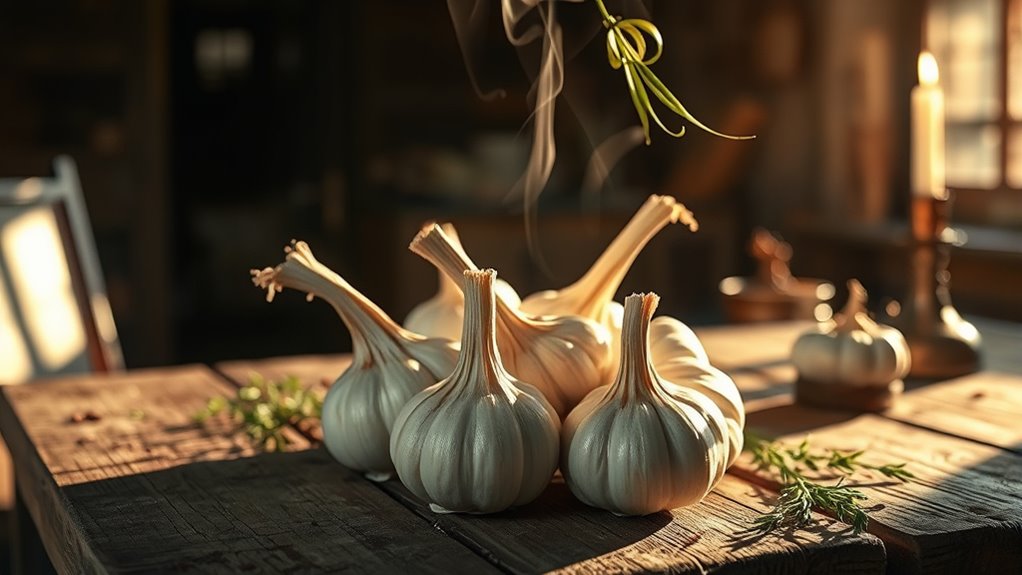Using garlic to ward off evil spirits is rooted in ancient folklore. Many cultures believed garlic protects against malevolent forces, often wearing it as an amulet or hanging it in homes. The strong aroma may also repel insects, supporting its protective reputation. While some view garlic as a superstitious charm, others see strength in faith and spirituality. There’s more to explore about garlic’s cultural significance and its role alongside other protective practices.
Key Takeaways
- Garlic has historically been used as a protective charm against evil spirits and malevolent forces in various cultures.
- The strong aroma of garlic, produced by allicin, is believed to repel insects and symbolize protection.
- Hanging garlic in homes or wearing it as an amulet reflects ancient practices aimed at warding off witchcraft and supernatural threats.
- Cultural beliefs about garlic’s protective qualities often intersect with folklore, emphasizing a blend of culinary and mythological significance.
- While garlic is seen as a protective object, true spiritual protection is emphasized through faith and relationship with God.
Historical Origins of Garlic in Folklore
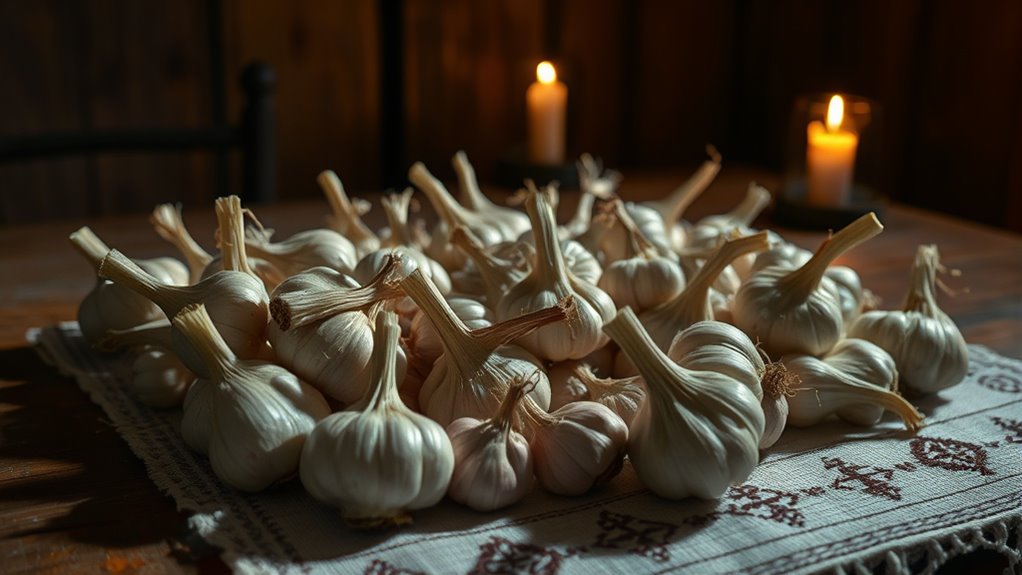
Garlic has long been viewed as a powerful protector against evil spirits, with its roots in various cultural folklore stretching back centuries.
Garlic has been revered for centuries as a potent guardian against evil spirits in diverse cultural folklore.
You’ll find that many ancient cultures believed garlic could ward off malevolent beings like vampires and demons. The Ancient Egyptians, for instance, placed garlic in tombs to protect against evil forces in the afterlife.
Similarly, folklore across the globe often featured garlic in rituals meant to shield against witchcraft and supernatural threats. People hung garlic in their homes or wore it as an amulet, convinced it provided safety.
While these beliefs are rich in tradition, it’s important to remember that they stem from superstition rather than any official religious doctrine.
Garlic’s legacy as a protector continues to thrive in cultural practices today.
Cultural Beliefs Surrounding Garlic
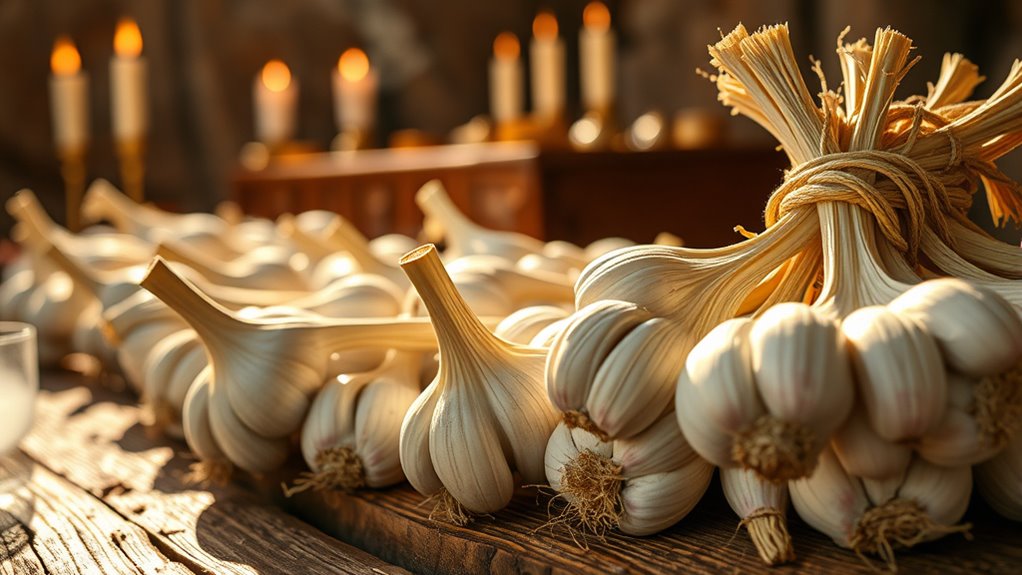
Throughout history, various cultures have embraced garlic not just for its culinary uses but also for its supposed protective qualities against evil spirits.
You might find it fascinating that garlic often appears in folklore as a defense against malevolent forces, like vampires. While these tales are rooted in fiction rather than official doctrine, they reflect deeper cultural beliefs.
As you explore these traditions, you’ll notice how garlic symbolizes spiritual growth and protection, intermingling with various customs over time.
In popular culture, garlic would look like a talisman, reinforcing its status as a protective charm. These beliefs remind us that garlic transcends its culinary role, embodying a rich tapestry of cultural significance that spans generations.
The Science Behind Garlic’s Aroma
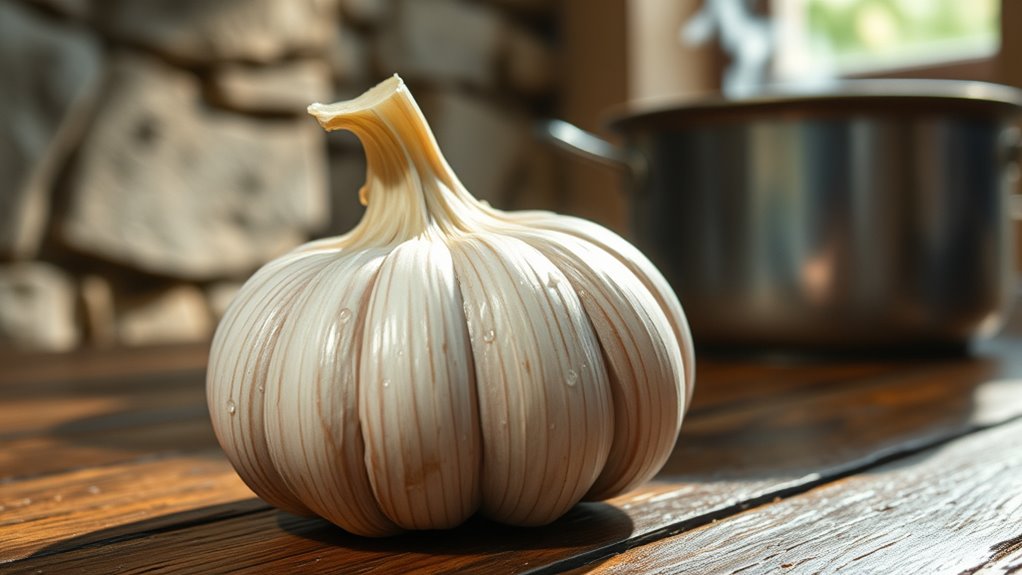
When you crush or chop garlic, you activate enzymes that transform alliin into allicin, releasing its strong aroma.
This distinctive scent isn’t just potent; studies suggest it might also repel insects, linking its fragrance to protective cultural beliefs.
Understanding these chemical compounds can shed light on why garlic has such a powerful reputation in warding off evil spirits.
Garlic’s Chemical Compounds
The distinctive aroma of garlic captivates the senses, primarily due to the compound allicin. You’ll find that allicin forms when you crush or chop garlic, as this damages the cells and activates alliinase, converting alliin into allicin.
This process releases various sulfur-containing compounds that create garlic’s pungent smell. Alongside allicin, compounds like diallyl disulfide and diallyl trisulfide contribute to its unique flavor and aroma, as well as its potential health benefits.
These sulfur compounds not only give garlic its strong scent but also add to its antimicrobial properties. Notably, the chemical composition of garlic can vary depending on factors like soil type and growing conditions, influencing both its aroma and health effects.
Aroma and Repellent Effects
Garlic’s unmistakable aroma not only tantalizes the palate but also plays a significant role in its reputation as a natural repellent. When you crush or chop garlic, it releases sulfur compounds like allicin, which give off that distinctive smell.
This strong odor isn’t just for culinary delight; studies suggest it may deter certain insects, showcasing its potential as a pest repellent. The antimicrobial and antifungal properties of garlic further enhance its protective qualities.
Many cultures have long associated garlic’s potent scent with warding off negativity and misfortune. So, whether you’re cooking up a storm or seeking to repel unwanted entities, that garlic aroma does more than just flavor your dish—it’s your shield against the unseen.
Cultural Beliefs and Practices
Although many might dismiss garlic as just a kitchen staple, its deep-rooted presence in cultural beliefs highlights its significance as a protective charm. Across various cultures, people associate garlic with warding off malevolent spirits, including fictional creatures like vampires. This belief stems from folklore, where the pungent aroma was thought to repel supernatural entities.
The distinctive scent, created by sulfur compounds like allicin, contributes to garlic’s reputation as a safeguard against evil. While scientific studies confirm garlic’s antimicrobial properties, suggesting a metaphorical defense against pathogens, it’s important to note that the effectiveness of garlic as a protective charm lacks empirical support.
Nevertheless, its role in rituals and superstitions continues to thrive, bridging the gap between cultural practices and science.
Comparison With Other Protective Practices
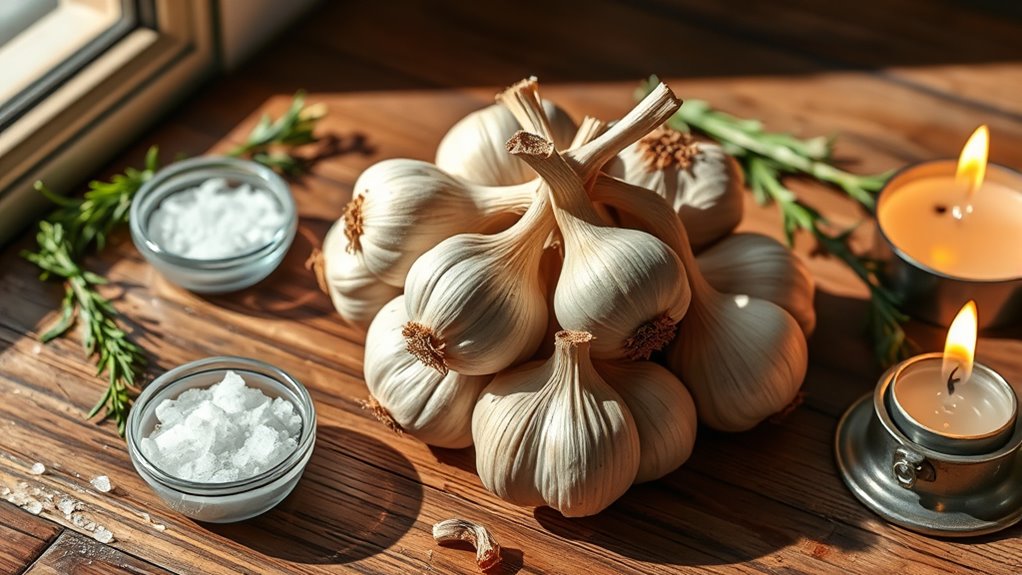
When you think about protective practices, garlic’s cultural significance stands out alongside the use of holy water and exorcism rituals.
Each method reflects different beliefs about warding off evil, with garlic rooted in folklore and holy water blessed for divine protection.
Let’s explore how these practices compare and what they reveal about faith and tradition.
Garlic’s Cultural Significance
Across various cultures, garlic is often viewed as a powerful protector against evil spirits, much like sacramentals such as crosses and holy water in Christianity. This belief stems from folklore, where garlic’s strong odor is thought to repel malevolent forces.
You might’ve noticed that garlic commonly appears in popular culture as a defense against vampires, though this idea doesn’t align with mainstream Christian doctrine. Instead, garlic’s protective role reflects a mix of local traditions and religious practices, blending superstition with spirituality.
Unlike sacramentals recognized by the Church for their spiritual significance, garlic’s effectiveness is primarily anecdotal, varying widely between cultures. This cultural significance illustrates how diverse beliefs shape our understanding of protection against evil.
Holy Water Usage
While many protective practices exist across cultures, holy water stands out in Christianity as a sacred sacramental believed to offer genuine spiritual protection.
Unlike garlic, which is tied to folklore and cultural beliefs, holy water is blessed by the Church, granting it unique spiritual significance. It’s recognized within Catholicism for its effectiveness in invoking divine protection, especially during exorcisms.
You’ll find that the power of holy water comes directly from God through the Church’s blessing, emphasizing its theological grounding. In contrast, garlic’s reputed protective qualities stem from superstition and culinary uses rather than any established doctrine.
Fundamentally, holy water serves a distinct purpose in spiritual intercession that garlic simply can’t replicate.
Exorcism Practices Overview
Exorcism practices within the Catholic Church provide a structured approach to combating evil spirits, contrasting with other protective measures like garlic.
The Church employs sacramentals, such as holy water and crosses, believed to invoke divine protection. There’s a clear distinction between simple exorcisms during Baptism and solemn exorcisms requiring a priest’s authority, emphasizing discernment between illness and demonic influence.
While sacramentals hold protective power, their effectiveness relies on your faith and the Church’s spiritual authority, not the objects themselves. This highlights a cultural tendency to seek various spiritual safeguards against malevolent forces.
Ultimately, the Church teaches that true reliance on God is essential for spiritual protection, reminding you that faith in Christ should always take precedence over any physical object.
Garlic in Popular Culture and Media
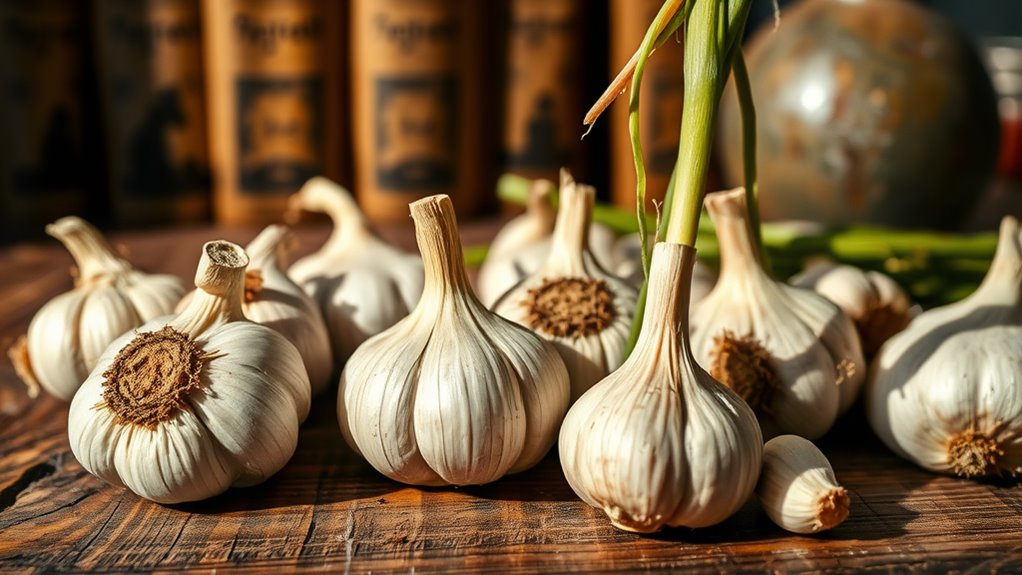
Garlic has long been a staple in popular culture, especially as a symbol of protection against evil spirits and vampires. Its role in folklore and horror genres highlights its legendary status.
Here are a few notable representations of garlic:
- Vampire Lore: In countless stories, garlic is essential for characters defending against vampires, emphasizing its protective power.
- Film Appearances: Movies often feature garlic as a tool for survival, showcasing its status as a go-to item against supernatural threats.
- Cultural Symbolism: Garlic’s association with crosses and holy water indicates a broader spiritual defense theme.
- Culinary Contrast: While garlic shines in folklore, it primarily serves culinary purposes, blending myth with everyday life.
The Role of Superstition in Spirituality
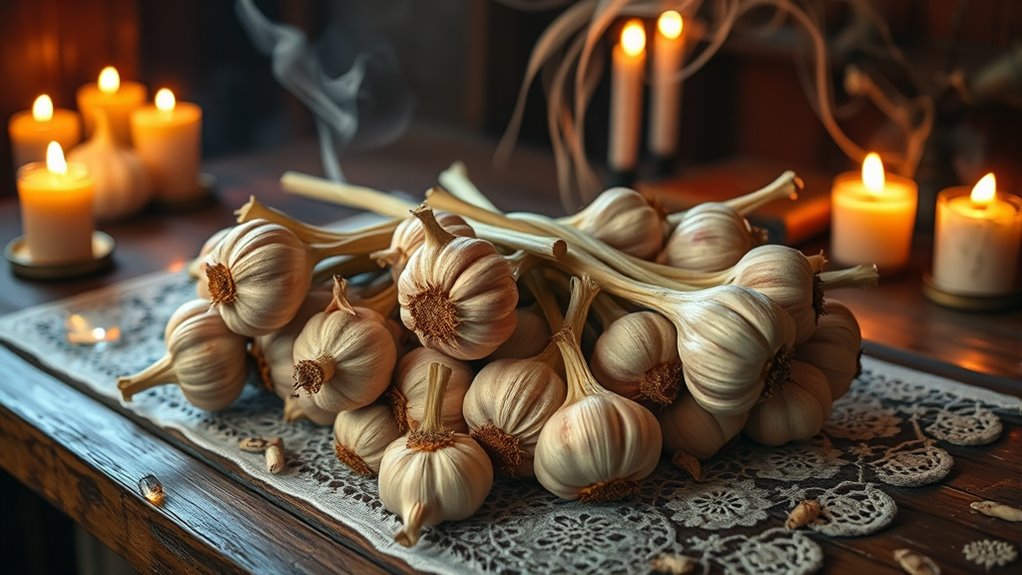
Although many people seek comfort in superstitions, it’s important to understand how they intersect with spirituality. Garlic, for instance, is often linked to protective qualities against evil spirits. However, these beliefs stem from folklore rather than official religious doctrine. While some embrace these superstitions, mainstream spirituality emphasizes a deeper connection with God, rather than reliance on physical objects. This blending of traditions can influence modern practices but risks veering into idolatry.
| Superstition | Spirituality | Key Difference |
|---|---|---|
| Garlic wards off evil | True strength in God | Focus on relationship |
| Object reliance | Faith and trust | Internal vs. external |
| Cultural beliefs | Doctrinal teachings | Origin of belief |
| Rituals | Sacramental practices | Nature of protection |
| Folklore | Spiritual guidance | Source of power |
Distinguishing Between Folklore and Religious Doctrine
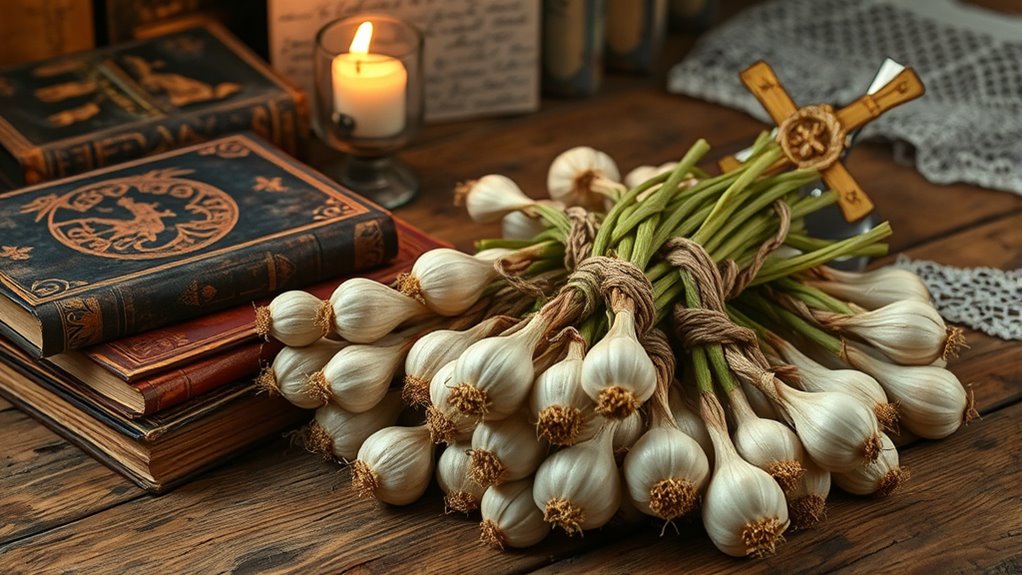
When examining the distinction between folklore and religious doctrine, it’s crucial to recognize that many beliefs, like the idea that garlic can repel evil spirits, arise from cultural traditions rather than established religious teachings.
Here are some key points to reflect on:
- Garlic’s protective qualities stem from superstition, not Christian doctrine.
- Christianity emphasizes spiritual protection through faith, not material objects.
- Sacramentals such as crosses and holy water hold spiritual significance but don’t include garlic.
- The Catholic Church promotes reliance on God’s power and prayer for safeguarding against evil influences.
Ultimately, personal faith and the presence of the Holy Spirit are viewed as more effective than relying on traditional items like garlic for protection against evil.
Frequently Asked Questions
Does Garlic Stop Witchcraft?
You might wonder if garlic can stop witchcraft. While many cultures believe in its protective properties, there’s no scientific evidence backing this claim.
Garlic’s reputation stems from folklore and traditions rather than proven effectiveness. It’s often used more as a symbolic gesture than a real safeguard.
If you’re looking for protection, consider focusing on practical measures and personal beliefs, as they tend to hold more value than relying solely on any herb.
What Creature Does Garlic Keep Away?
Garlic’s famous for keeping away vampires in folklore, thanks to its strong scent and historical associations.
Many cultures believe that its pungent aroma can deter these mythical creatures, making garlic a staple in various legends and stories.
If you ever find yourself in a conversation about supernatural beings, mentioning garlic might spark some interesting tales!
Just remember, these beliefs are rooted in tradition rather than proven fact, so enjoy garlic for its culinary benefits too.
What Does Garlic Protect Against?
Think of garlic as a shield in your kitchen, warding off unwanted flavors and odors.
When it comes to protection, garlic’s reputation primarily lies in its health benefits. It boosts your immune system, fights off infections, and can even help lower blood pressure.
While it’s not a magical barrier against evil, incorporating garlic into your diet can certainly help you fend off some of life’s pesky ailments and keep you feeling your best.
Why Do People Put Garlic Around the House?
You might notice people placing garlic around their homes for various reasons. Many believe it brings good luck and wards off negative energies.
Some cultures view garlic as a symbol of strength and resilience, enhancing its protective reputation. By hanging it in doorways or windows, you’re creating a barrier against unwanted influences.
This practice, steeped in tradition, reflects a desire for safety and well-being in one’s living space.
Conclusion
In the tapestry of history, garlic weaves a potent thread, warding off shadows that lurk in the corners of our minds. Its pungent aroma dances like a protective spell, grounding you in age-old beliefs. As you embrace the folklore surrounding this humble bulb, remember that the strength of tradition can illuminate even the darkest paths. So, whether you’re seasoning a meal or seeking spiritual solace, let garlic be your steadfast guardian against the unseen.
